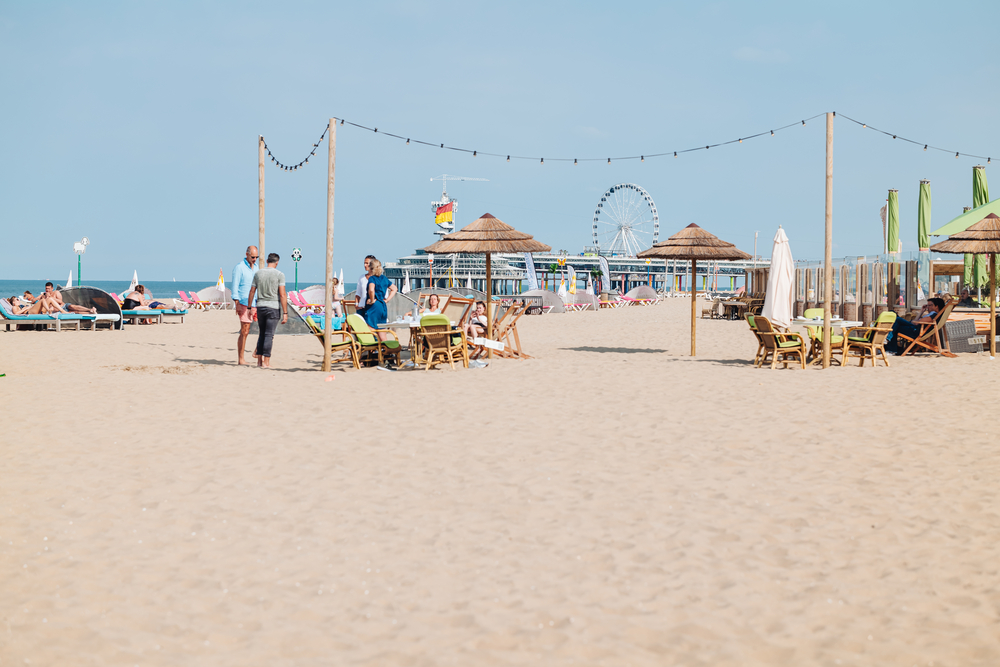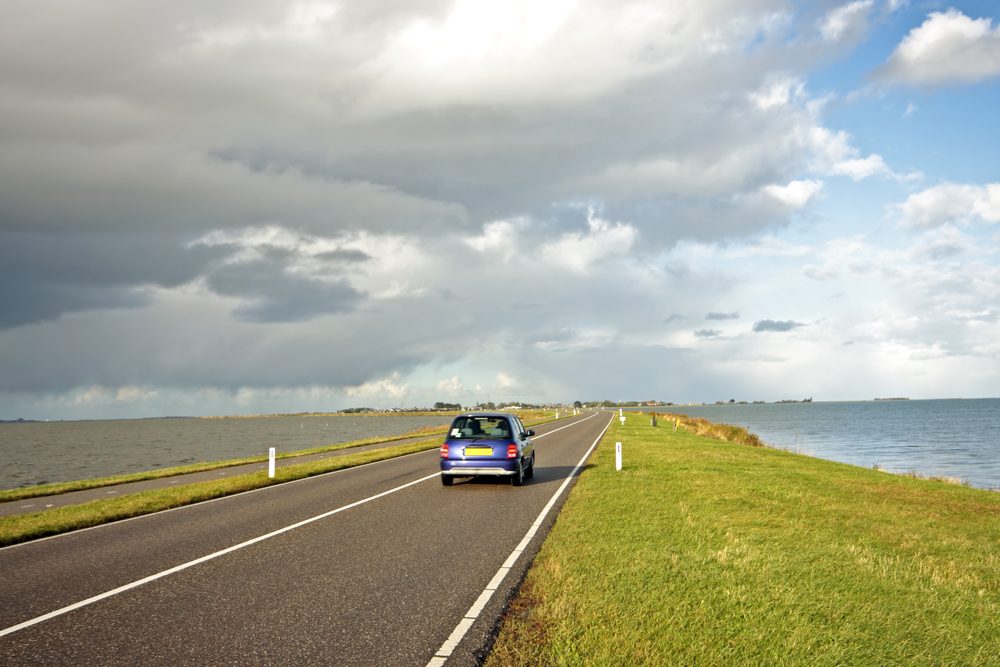The global climate is changing, in fact, it’s really heating up over here. 🥵 Melting ice caps, natural disasters and rising sea levels — what does all of this mean for the Netherlands?
One thing is for certain, the lowlands are, well, low. Dutch coasts will notice the effects of rising sea levels sooner rather than later considering that almost the entire country is situated below sea level.
But what other effects will climate change have on the low-lying Netherlands? Here are just some of them.
Temperature rise in the Netherlands 🌡
Did you notice how very little snow there was this year? And how warm March was this year? These are the first felt effects of global warming on the Netherlands.
According to the official Dutch government website, temperatures have risen by 0.8 degrees Celcius worldwide since 1900, but that rise is estimated at 1.7 degrees in the Netherlands. That is twice as fast as the world’s average temperature rise.
Okay, that sounds scary but there’s good news too! While the heatwave may have been very devastating in some other parts of the world, the Netherlands is well prepared. The Dutch National Institute for Public Health and the Environment (RIVM) has prepared a so-called National Heat Plans.
The National Heat Plans are called into action when it gets unusually warm in some areas of the Netherlands. They warn people to stay hydrated, wear thin clothing, try as much as possible to stay in the shade and apply sunscreen regularly.

Rainfall in the Netherlands 💧
It rains a lot in the Netherlands, that’s not just a stereotype. According to Statistica, it rained a total of 139 days in 2019. Which is more than one-third of the time.
However, overall, rainfall has (unbelievably) been decreasing since the 2000s. Instead, rain showers come down harder with greater intensity.
And why does that matter for the Netherlands? Well, for one, it puts Dutch cities at a greater risk of flooding if there is a lot of rain coming down at once. We’ve seen that, especially last year when the southern region of Limburg experienced terrible damage after heavy rainfall.
It also makes the Dutch coast erode quicker, and causes the many Dutch canals and waterways to overflow.
Sea level rise in the Netherlands 🌊
For a country situated below sea level, the Netherlands does a pretty good job of keeping the sea at bay. The Dutch are experts at water management — building dams, sand motors and redirecting water flows so the Netherlands stays afloat despite the ever-rising sea.
Read More │ Rising sea levels in the Netherlands: the Dutch battle against flooding
According to the Netherlands Environmental Assessment Agency, 29% of the Netherlands is at risk of river flooding. In total, 55% of the country is at risk of being submerged underwater at one point in the future.
The report concludes that overall, the Netherlands should be considered sensitive to flooding because of climate change. However, on the upside, the country is equipped to handle approximately two or three metres of rising sea levels for the time being.
Water pumps, dykes and expert water management strategies combined with the relative wealth of the Netherlands give reason to relax just a little. At least for now.

Health Issues 😷
Climate change also affects public health. According to the RIVM, persistent hot weather brings health risks to vulnerable groups like the elderly, people in care institutions and children. Here are just some of these risks:
- Poorer air quality can lead to respiratory diseases.
- Warmer climates increase pollen flight and, thus, allergy symptoms.
- Certain infectious diseases such as Lyme disease or West Nile Fever are more likely to spread.
- Increased exposure to UV rays increases skin cancer risks.
Are there risks? ⚠️
Actually, you could say that the weather in the Netherlands has become more extreme, and there are no signs of things getting better in the future. With temperatures increasing in the Netherlands, there will be more heavy showers and extended heat waves in the summer.
In general, the weather will become more extreme. Already now in 2022, we’ve seen several severe storms sweeping across the lowlands. Remember the terrible-triple — Corrie, Dudley and Eunice? Oh, and Franklin. 🌪
Some effects of the flooding and storms over these past few months were truly devastating. Loss of biodiversity, the costs of rebuilding infrastructure and some people even lost their lives.
So, yes. There are indeed risks.
Are you feeling the effect of climate change in the Netherlands? Let us know in the comments!
Editor’s Note: This article was originally published in August 2018, and was fully updated in March 2022 for your reading pleasure.

FUny to see the path through the water is near my hous, Hoornseplas Groningen.
Nice article by the way.
Hi, Is there a possibility hurricanes will reach the Dutch coast in the future as the world’s oceans continue to warm? I’m guessing it is not likely before the 22nd century and the British Isles will act as barrier, but if there is a possibility, is the current system of dykes and canals built to withstand the water surge that occurs when strong hurricanes push to the shore? Thank you, Eddie Garrity
I have to agree with Jeffh, it is outright ridiculous climate change has become a subject where two opposite opinions seem to be acceptable. Journalism does have great impact on the question ‘what is an acceptable opinion?’, therefore it is vital no misinformation or misinterpreted information is presented as truth.
Also I am missing clarification on who the experts mentioned in the article would be.
I remember when I was a kid, about twenty years ago, there was already a lot of evidence and debate regarding the matter. Either you would open up for the discussion or you’d call it a problem for the next generation. I can’t help but ask myself how the latter opinion changed into ignorance and outright denial.
Today, first time temperatures rise above 40 degrees Celsius, good for tourism, could be, but a little too hot for me. So new heat record today: 40.7 °C.
Debber, I just read your comment of July 25, 2019, in which you stated that the temperature was 40.7 degrees C. It reminded me that when I was attending the Meisjes Lyceum in Maastricht the summer of 1952, the temperatures were getting uncomfortable. We attended school until the middle of July in those days. Notice was given that if the temp would reach 34 Celsius, the schools in the city would close. We came close that summer but never reached that magic number. School continued as scheduled. My family left in August 1953 for Canada and then we experienced hot weather like we never experienced in the Netherlands!
“In the Netherlands, it rains about 8% of the time”: where do you get this data from? It is extremely low, can you double check?
Hey STCL, thanks for your comment! The data is from KNMI, the Dutch Meteorological Institute. While 8% does seem low at face value, this does not mean it rains 8% of days, but 8% of time. So if there is a 525,600 minutes in a year, it rains 8% of this – still substantial for this rainy country! http://bibliotheek.knmi.nl/weerbrochures/FS_Regen.pdf
I won’t choose to be a climate denier, the climate changes with time, mother nature has her menstruals like all mothers.
Your article says that the Netherlands can handle 2 – 3 meters in sea level rise. Noah’s satellites tell us that sea levels have been rising at the rate of 1/8″ per year since records have been kept. At that rate it will be 200 – 300 hundred years before the Netherlands is under water.
Let’s assume that the current conditions are going to increase to the severity of one-inch per year, that will never happen. But, assuming that it does that relates to 75 – 100 years.
People and animals acclimated to weather, always have all ways will. In my 80 years on the planet I have lived in climates that were minus 55° WO windchill factor, and upwards of 115°. These conditions weren’t comfortable but I adapted.
Opinion. There are those who will not accept that the climate is changing, then there are those who beleive that the world is going to end in 12 years. Al Gore, who started all this claimed NYC would be under water by now, hasn’t happened.
If we as a society feel it nessicary to help mother nature by eliminating fossil fuels, curbing climates changes, by all means take those steps, but make them baby steps. We have the time.
Dont be sold on scarce tactics, that is what’s driving the current CC issue. It is being force upon the occupiers of this Wonderful World, by the money machine of the wealthy. It’s all about the money.